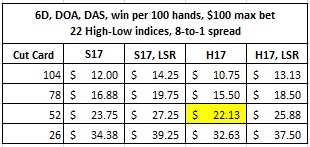The World's Greatest Blackjack Card Counter: Frequently Asked Questions (FAQ)

I posted two articles on this blog that address the second myth given above. These articles give an absolute upper-bound on the earning potential of a perfect high-low blackjack card counter. These articles hypothesized the world's greatest high-low card counter and determined his optimal win-rate. Here is the counter I considered:
- The card counter uses the high-low card counting system.
- The card counter knows every strategy index and plays perfectly.
- The card counter plays exactly 100 hands.
- Whenever the true count is above the index at which he has the edge, he wagers $100, otherwise he does not make a wager.
- The casino doesn’t care about this counter and lets him play without “heat.”
In other words, we have a perfect card counter who is playing 100 hands, wagering $100 whenever he has the edge, otherwise he is sitting on his hands. Because he never wagers when the casino has the edge, and he wagers a flat amount of $100 when he has the edge, the earnings for this card counter are the maximum possible for any counter with a maximum bet of $100. Again, this card counter is winning at the maximum possible win-rate for a high-low card counter with a maximum bet of $100.
If you haven’t read my previous articles (or heard me talk about this topic), then this is an opportunity for you to take a quick quiz. Here are two quiz questions:
- If this card counter plays a six-deck shoe game with the rules H17, DOA (double on any two first cards), DAS (double after split), with the cut card placed 52 cards (1 deck) from the end, then on average how much do you think he will he earn per 100 hands?
- If this card counter plays a two-deck game with the rules H17, DOA (double on any two first cards), DAS (double after split), with the cut card placed 29 cards from the end, then on average how much do you think he will he earn per 100 hands?
After you have your guesses, divide them in half. Ready? And here are the answers:
The average blackjack card counter earns far less. The following table gives some win rates for real-world blackjack play:

For more information, read my blog post, "The Win-Rate of the Average Blackjack Card Counter."
There is genuine disbelief in these numbers from both sides of the table. In my seminars, most in attendance guess $200 or more. I had one trainee guess $8,000. The magnitude of these overestimates is not limited to the casino-side. Most card counters falsely believe they are making a lot more as well. Hopefully this FAQ will clear up some misunderstandings.
The World's Greatest Blackjack Card Counter FAQ
Question 1. You must have made a mistake in your computer simulations. How can I trust that your results are right?
Question 2. I am winning at a much higher pace than your numbers suggest is possible. How can you be right when I am winning so much more than you predict?
Question 3. What point are you trying to prove beyond telling casinos that they should basically ignore red chippers who might be counting?
Question 4. In your six-deck results, you say that the card counter should play at +1 and above. But doesn’t the house have an edge at a +1 true count?
Question 5. You have the player play whenever the count is +1 or higher. Can’t he make more money by wagering when the true count is higher so that he has a bigger edge?
Here is the equation that gives the card counter's earning potential:
Win-per-100-hands =
($100)x(100 hands)x(average edge)x(bet frequency)
Question 6. I bet a lot more than $100 as my maximum bet, so I will make a lot more than your numbers suggest. How can you say your numbers are valid for me?
Another reason for the “100 hands at $100” scheme is that I use the same parameters for all of my card counting analysis. This allows various card counting opportunities to be compared and ranked against each other.
Question 7. I use Kelly betting, so I win at the maximum possible rate, how can you say that you can win more without using Kelly betting?
For most professional card counters, Kelly betting is a non-issue. Sufficiently well-funded players and teams have more practical limitations. These include avoiding CTRs as well as low table maximums and heat avoidance.
Question 8. I use a much better card counting system, how much more will I make?
The win-rates I give are unattainable in practice. Your best practical win-rate with a stronger system is almost certainly lower than these optimal theoretical results.
Question 9. I play a game with much better rules and cut-card placement than those you wrote about. Aren’t I making a lot more because of having a better game?
Question 10. What about a single-deck game where blackjack pays 6:5 and the penetration is down to last 12 cards and using a count which includes side counting values such as 7,8,9,5 and Ace for more accurate play variations?
Question 11. In your article, a person with a $ 5000 max bet will win $3314 per 100 hands. So at approx 30 hands per hour back counting, is he looking at $ 1100 per hour?
The terms to read about to fully understand this are "average edge" and "bet frequency." I write about them in this post.
Question 12. What software should I buy if I want to double check your results or run my own simulations?
Question 13. I wouldn't be surprised if you work for the casino industry with your propaganda talk; someone interested in counting could find this article and actually believe counting isn't worth it.
Question 14. I have to say that I disagree with you and think your article is pure Bull****. I believe that card counting does give the player a huge edge and it is not a waste of time.
Question 15. You are one of the biggest sociopathic, self-hating imbeciles in gambling history. But yes, your math is right.
Question 16. You are wrong.
Question 17. I think you couldn't cut it as a card counter so your ego has the only possible explanation that counting doesn't work no matter what the computer data says.
Question 18. You say you used the numbers you did so the results can be scaled. So,the Greatest DD player with a $500 Max Bet will make $330/hr. And, with a Max Bet of $1,000 she is making $660/hr. Do you make significantly more than $300 - $600/hr at your job? Do most people?
Question 19. Everything you do is self-serving and this was no different, so you used a low max bet to emphasize your point, that card counter are no threat and casinos should focus on other methods of AP and more precisely your services.


